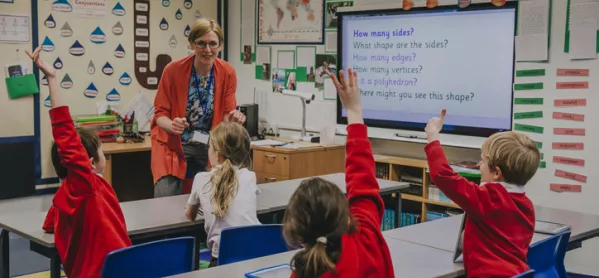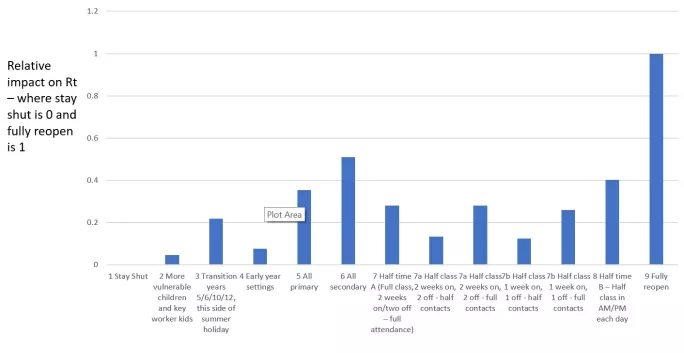Pupils attending schools in half classes on a one-week-on/one-week-off basis would have the lowest impact on the rate of the spread of Covid-19, according to government scientific evidence published today.
That’s despite government guidance published last week that said schools should not plan to reopen on the basis of a rota system, either daily or weekly.
Documents released today by the Scientific Advisory Group for Emergencies (Sage) today also suggest an option of prioritising younger teachers’ attendance above older teachers in a rota model.
Exclusive: Schools to defy DfE over pupil rotas
Related: Track and trace needed for school openings, says SAGE
Independent SAGE: June 1 ‘too soon’ to open schools
The relative impact on the spread of coronavirus (where all schools staying shut is 0 and fully opening is 1) is given for different scenarios in the evidence released today.
The current scenario with vulnerable children and key workers’ children in attendance has an impact of 0.04, whereas if primaries were to fully open the impact would be 0.35. If just the transition years in primary were to return, the impact would be at just above 0.2.
However, if schools were to open in half classes on a one-week-on/one-week-off basis (with half contact) or on the same basis with a two-week-on/two-week-off rota, the impact would be only around 0.12, according to the evidence.
The documents state that in this model, “it would be possible to prioritise younger teachers’ attendance as long as this was negotiated rather than imposed. Other staff could remain at home and facilitate distance learning”.
Meanwhile, the DfE says it has noted there is “merit for further consideration” in rota systems, but says it is sticking by its guidance from last week asking primary schools not to plan on the basis of rotas.
It says rotas do not provide “the consistency of education and care” it wants to re-introduce “particularly with regards to parents returning to work”, and also that rotas are likely to require “more regular and burdensome cleaning” as well as limiting staffing options because “staff will also need to stay on the same rota”.
The DfE says rotas are “more challenging to combine in a low-risk way” with full-time provision for priority groups, as those children would be more regularly exposed to changing groups of their peers.
Education Secretary Gavin Williamson said: “The papers published by SAGE today show that the phased, cautious return of a limited number of pupils to classrooms has been a carefully considered decision based on the best scientific and medical advice.
“My department continues to engage with the school, college and nursery sectors and I am enormously grateful for all the planning and preparation they are doing, alongside local authorities and academy trusts.
“The welfare of children remains at the very heart of everything we are doing because being able to be back in school will benefit not just their education but also their wellbeing.”
The SAGE evidence also states that: “[Rota scenarios] are good ways to stop extensive transmission chains in schools. When this effect in schools is embedded into the wider community, the impact is less strong, but still has some value in reducing overall R.”
However it says the rota models are the “least robust of the [schools opening] scenarios and that further exploration is needed”.
It states: “Parents of younger children may not be able to align their working time with the rota system or may be sceptical of the limited school offer. This might be particularly challenging where parents have different children with different rotas.”





